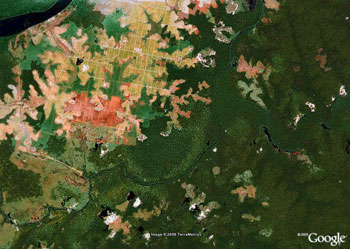Borneo governor arrested in rainforest for palm oil fraud
Borneo governor arrested in rainforest for palm oil fraud
mongabay.com
December 20, 2006
The governor of East Kalimantan on Indonesian part of the island of Borneo has been suspended and faces life in prison for his involvement in an oil palm plantation scheme that caused the deforestation of a million hectares of tropical rainforest.
Suwarna Abdul Fatah has been charged with corruption, fraud, and abuse of power in connection with a multi-million dollar palm oil plantation in Berau district, along the Indonesia-Malaysia border, in an area near the “Heart of Borneo”, a region characterized by rainforest and high levels of biological diversity. Fatah allegedly issued a permit for million hectare (2.5 million acre) oil palm plantation without government approval. The company which obtained the permit, cleared the land for timber but never established the oil palm plantation. Fatah is accused of causing losses of $42 million to Indonesia through the illegal logging of some 700,000 cubic meters of wood.

Oil palm plantations in and around Tanjung Puting National Park in Kalimantan, Indonesian Borneo, satellite image courtesy of Google Earth. At $400 per metric ton, or about $54 per barrel, palm oil is competitive with conventional oil. In the future, palm oil prices are expected to fall further as more oil palm comes under cultivation. With cheap land, abundant labor, and ideal climate, investors and developers are eyeing tropical Africa as the next major producer of palm oil. |
Millions of hectares of forest have been cleared in Borneo for logging and the establishment of oil palm plantations. Some critics say that forest-clearing for oil palm is often a guise for logging since oil palm plantations receive special tax breaks from the Indonesia government. Fatah’s arrest suggests that these claims are not without basis.
Pressure from environmental group WWF has recently spurred the three countries that control Borneo — Malaysia, Indonesia, and Brunei — to agree to protect some 84,000 square miles (220,000 square kilometers) of mountainous rainforest in the center of the island. WWF says that more than 400 previously unknown species have been discovered in Borneo since 1994.
Related article
Why is oil palm replacing tropical rainforests?. Recently much has been made about the conversion of Asia’s biodiverse rainforests for oil-palm cultivation. Environmental organizations have warned that by eating foods that use palm oil as an ingredient, Western consumers are directly fueling the destruction of orangutan habitat and sensitive ecosystems. So, why is it that oil-palm plantations now cover millions of hectares across Malaysia, Indonesia, and Thailand? Why has oil palm become the world’s number one fruit crop, trouncing its nearest competitor, the humble banana?







